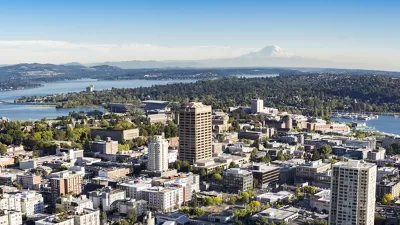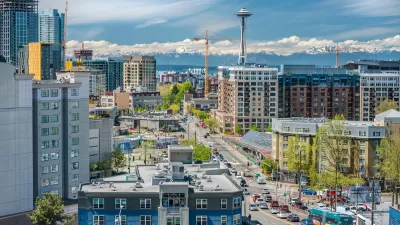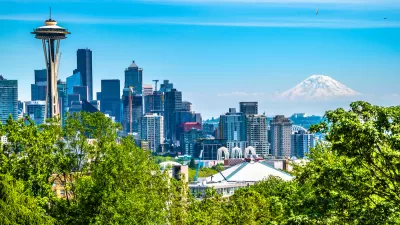An amendment increasing affordability requirements to 60% for housing built on church-owned property has come under fire from Black church leaders who call it a death knell for many affordable housing projects.

An amendment to new density bonus legislation in Seattle has come under fire from Black church leaders, who say that the reduced AMI requirement spells failure for many church-owned developments, writes Natalie Bicknell. "The legislation, which provides density bonuses (i.e., development capacity increases) to religious institutions seeking to build affordable housing on land they own or control, was supposed to be a way for Black churches to create homes for members of their communities impacted by displacement. But an amendment sponsored by Councilmember Lisa Herbold (District 1, West Seattle) deepening affordability requirements from 80% to 60% or less of area median income (AMI) has stirred up uncertainty."
Donald King, president and chief executive officer of the Nehemiah Initiative Seattle, called the change "a poison pill" that excludes the very households it was meant to benefit. "Modest Black churches and small BIPOC-led development firms simply cannot build to this level of affordability. The amendment is another action in the decades of well-intentioned measures that do more harm than good to the financial growth and independence of the Black community." The bill, HB 1377, "requires that cities grant density bonuses in the form of increased maximum building heights, density, and/or floor area limits to property owned or controlled by religious institutions in exchange for the development of affordable housing." Tenants "may not be charged rents exceeding 30% of their annual incomes" for rental units.
"In order to avoid disrupting development plans already in the works, the 60% AMI requirement will not come into effect until July 2022. Additionally, affordable housing projects receiving funding from the City of Seattle already have to meet the 60% AMI requirement per existing policy from the Office of Housing (OH)."
Councilmembers who supported the amendment argued that "prices at the 80% AMI threshold were comparable to market rate housing prices" and, to receive the exemption, churches must do more to ensure the housing they build goes to the neediest families. But "[a]ccording to the development scenarios conducted by the UW, the majority of the developments that are financially viable at 80% AMI, simply do not pencil out at 60%, a difference King describes as 'stark.'" With the 80% AMI requirement, analysis shows that "a typical church with 5,000 square feet of extra land could build an 18-unit family housing project which would cover its costs and earn about a 4.2% per year yield before interest. The same project targeting 60% AMI would yield only 2.9%," a discrepancy that could mean the difference between profitability and bankruptcy.
FULL STORY: Seattle Black Faith Leaders Urge Mayor Durkan Not to Sign Amended Density Bonus Bill

Maui's Vacation Rental Debate Turns Ugly
Verbal attacks, misinformation campaigns and fistfights plague a high-stakes debate to convert thousands of vacation rentals into long-term housing.

Planetizen Federal Action Tracker
A weekly monitor of how Trump’s orders and actions are impacting planners and planning in America.

Chicago’s Ghost Rails
Just beneath the surface of the modern city lie the remnants of its expansive early 20th-century streetcar system.

Bend, Oregon Zoning Reforms Prioritize Small-Scale Housing
The city altered its zoning code to allow multi-family housing and eliminated parking mandates citywide.

Amtrak Cutting Jobs, Funding to High-Speed Rail
The agency plans to cut 10 percent of its workforce and has confirmed it will not fund new high-speed rail projects.

LA Denies Basic Services to Unhoused Residents
The city has repeatedly failed to respond to requests for trash pickup at encampment sites, and eliminated a program that provided mobile showers and toilets.
Urban Design for Planners 1: Software Tools
This six-course series explores essential urban design concepts using open source software and equips planners with the tools they need to participate fully in the urban design process.
Planning for Universal Design
Learn the tools for implementing Universal Design in planning regulations.
planning NEXT
Appalachian Highlands Housing Partners
Mpact (founded as Rail~Volution)
City of Camden Redevelopment Agency
City of Astoria
City of Portland
City of Laramie





























